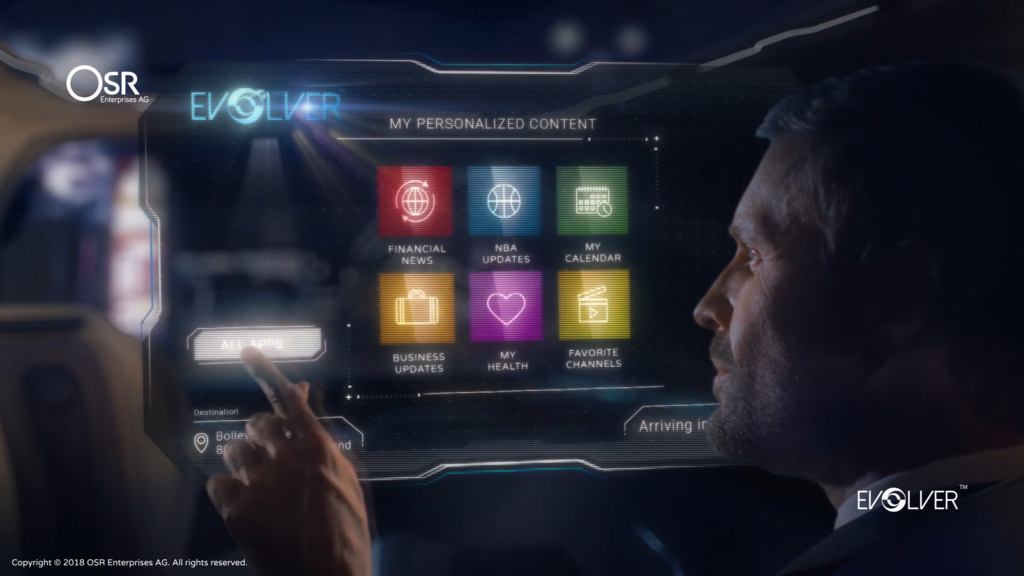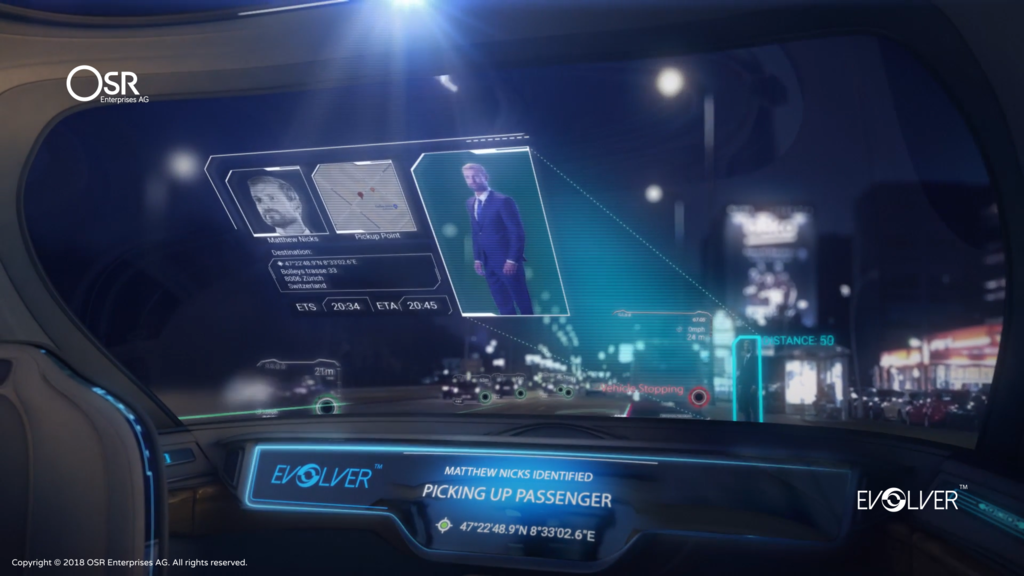According to OSR Enterprises AG, the vehicle of the future will function through a single central brain. Since its founding in 2011, the Swiss high-tech company has maintained that traditional vehicle E/E architecture is in urgent need of a reboot.
This technology will allow next-generation cars to be even smarter, more service-oriented, with greater Cybersecurity, while being manufactured and sold for a much lower price.
To implement this technology, the company has developed the EVOLVER, a ground-breaking artificial intelligence (AI)-based platform that serves as the vehicle’s central brain. As such, EVOLVER is both a hardware and software solution to the challenges faced by the industry.
EVOLVER’s revolutionary electric and electronic (E/E) architecture positions automotive manufacturers with the practical means to produce the next-generation vehicles, to include autonomous vehicles, in the near future.
One of the greatest current technological revolutions can be seen in the automotive industry, where exciting innovations are appearing at an accelerating rate.
When we consider the pace of innovation throughout the history of the industry, this new wave of innovation raises many questions, such as, what has been keeping the industry from introducing ‘smart’ cars for so many years? What field of technology will dominate among practical automotive solutions? Or the question the media are most eager to be answered, who will be the first to produce a fully autonomous vehicle?
According to OSR Enterprises, the short answer is that current vehicle E/E architecture cannot provide the speed, efficiency, reliability, and safety needed for the innovations planned for the vehicles of tomorrow. This current ‘distributed’ E/E architecture is a tangled assembly of anywhere between 60 and 150 computer and control systems that are scattered throughout the vehicle. OSR’s EVOLVER is designed to replace this with a centralized E/E architecture, with a single central AI-powered brain at its core. Once connected to all sources of information in the vehicle, the platform can help the vehicle make better, more efficient, and safer decisions in every aspect of the driving experience.
Contrary to the rest of the industry, OSR believes that autonomous driving is just a small part of the functionality that we will be seeing in future vehicles. In fact, they believe that improving the overall driving experience, and how we utilize the time spent in our cars, will achieve their main objective: to improve our quality of life.
“The type of car that people want to see in the near future is only possible if it relies on a smart, AI-based central brain,” explains Orit Shifman, the founder and CEO of OSR Enterprises. “We’ve been changing the future from the moment we began, in 2011. Not by developing technology to solve a particular problem or functionality but by creating a holistic solution, a unique, practical platform for the automotive industry to build upon and move into the future. Innovations in the industry today continue to be focused on delivering particular functionality through single device that collects and hoards resources only for its own use. The way forward is by sharing data, power, and other resources among all devices connected to the architecture, for better efficiency and greater functionality. This is why we developed the EVOLVER; a centralized brain platform for vehicles, powered by AI, and based on unique hardware and software, monitoring, maintaining, and securing vehicle E/E communication for current and new models, but especially for cars of the future.”

According to Shifman, understanding the need for a shift from the traditional distributed architecture, and moving to a centralized architecture monitored by AI, sooner will help the industry avoid wasting huge amounts of time and money coming to the same conclusion. The type of car, and the driving experience, that manufacturers are planning for future vehicles is not feasible using the architecture they are using now.
In a contemporary vehicle, the E/E architecture connects and serves between 60 and 150 electronic control units (ECUs), which control different functions powered by electricity. This includes everything from the power steering, acceleration, and breaking, to the headlights, break lights, and the heating, not to mention, the infotainment (information and entertainment) systems.
The distributed E/E architecture, still used in cars today, was first developed several decades ago. What might have proved to be a practical solution for analog technology back then, is far from being adequate in the digital age of rapid communication.
Even if we overlook the inefficacy of slow and hindered communication across this architecture, its protocols and technology were designed long before the term Cybersecurity even existed. With growing demand for connectivity in vehicles, relying on this outdated and vulnerable technology exposes the systems to Cyber threats, jeopardizing the safety of the vehicle and its passengers.
Altogether, it is easy to imagine how distributed architecture has limited the abilities of automakers to evolve and produce the car of the future.
OSR Enterprises is a Swiss company with operations around the globe, including an advanced research and development center in Israel. Their EVOLVER platform is designed to enable automotive manufacturers transition from traditional distributed E/E architecture, to a more efficient, more advanced, and more importantly, much safer centralized architecture with the EVOLVER AI-powered central brain at its core.
The EVOLVER collects all available internal and external data, from sensors and cameras to devices and applications connected to the Internet. This data is then processed and with the help of unique, patented artificial intelligence-based technology the EVOLVER learns the needs of the driver and passengers, and helps provide a smarter, better personalized driving experience and innovative services that will influence their quality of life.
As such, the EVOLVER is can provide the means for full autonomous driving via its platform (subject to individual country legislation).
“Our research and development center in Israel is growing stronger,” says Shai Nissim, Director of OSR Enterprise AG’s R&D center in Israel and leading strategist for Products and Innovation. “We’re currently recruiting the best technologists available, now that we’re focused on significantly increasing the R&D volume at the Israel center. Just recently, we also embarked on the next stage to fulfilling our vision, and begun developing a car for the future, as we see it, that will enable a better lifestyle for each and every one of us.”

Currently in its sixth version, OSR has been selling the EVOLVER to most of the world’s leading car companies.
It was first unveiled to the public at the IAA international motor show in Frankfurt, in 2017, when it was still in its third version. Two years later, OSR returned to the 2019 IAA motor show to reveal their collaboration with iconic car manufacturers, Jaguar-Land Rover, showcasing the fourth version of EVOLVER installed as the main brain in the manufacturer’s new electric vehicle, the Jaguar I-PACE.
That same year, OSR expanded its collaboration with Toshiba Memory as part of movement to transform the car from merely a mode of transportation to a “Datacenter on Wheels”.
This is only a small sample of OSR’s collaborations. There are many more joint initiatives, which the company has chosen to keep under wraps, but look forward to revealing to the public with the unveiling of the latest version of EVOLVER.
“Today’s automotive companies understand the significance of the change required in their approach,” adds Shifman. “They need to break away from decades-old conventions if they are to achieve fully-autonomous driving and provide digital services based on advanced technology. All this, while increasing personal security within the vehicle. We have been working with world-leading automotive companies under the radar, and selling them our unique technology, for years. And today we are developing and growing at an accelerated pace.”
Generally speaking, change in the automotive industry is very slow when compared to other technological industries. However, over the past year we have witnessed a major change in pace as manufacturers introduce new technologies in their vehicles far more frequently.
Despite this, manufacturers are still limited and could be making greater leaps forward, were they to rely on a centralized architecture, enabling the vehicle to operate faster, better synchronized, and with greater protection.
Orit Shifman, a serial entrepreneur, and already one of the most notable women in 2011, is one of the few women in the world who is both founder and CEO of a company in the automotive industry.
“When I started the company, many years before the start of the ‘auto-tech trend’, certain parts of the industry were still closed to outsiders, and I knew that there would be a long road ahead of me. But through collaboration and consistency, we’ve managed to create awareness of bold new technologies and promote acceptance of new ideas and methodologies within a traditional industry.”
“We have proven that we are leaders for change, having led technological thought processes, to revolutionize the industry, throughout the last decade. Our collaborations with Jaguar Land Rover, and other leading international manufacturers, whose identities haven’t yet been revealed, prove that we have made a genuine difference.”
“Our technology will completely change the driving experience as we know it. Considering the significant increase in our customers’ demands, we are expanding our team in Israel and around the world, selecting the best and most talented to join us. The next two years are going to be significant for the company, technologically and commercially. After this long journey, we are reaping the rewards.”